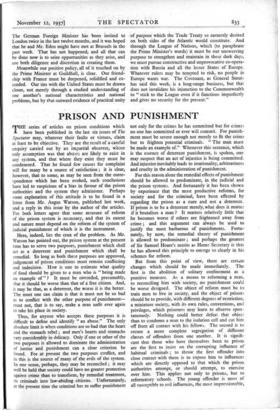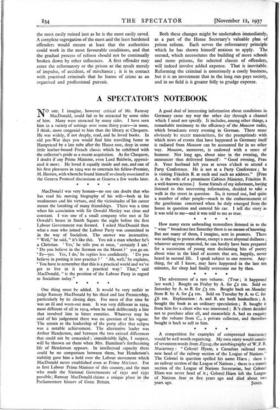PRISON AND PUNISHMENT
THE series of articles on prison conditions which have been published in the last six issues of The Spectator may, whatever their faults or virtues, claim at least to be objective. They are the result of a careful enquiry carried out by an impartial observer, whose only assumption was that abuses are likely to exist in any system, and that where they exist they must be condemned. That he found few causes for complaint will for many be a source of satisfaction ; it is clear, however, that to some, as may be seen from the corre- spondence which has been evoked, such conclusions have led to suspicions of a bias- in favour of the prison authorities and the system they administer. Perhaps some explanation of this attitude is to be found in a letter from Mr. Angus Watson, published last week, and a reply in this issue by the author of the articles. For both letters agree that some measure of reform of the prison system is necessary, and that its extent and nature must depend on the reform of the system of judicial punishment of which it is the instrument.
Here, indeed, lies the crux of the problem. As Mr. Watson has pointed out, the prison system at the present time has to serve two purposes, punishment which shall act as a deterrent and punishment which shall be remedial. So long as both these purposes are approved, judgement of prison conditions must remain conflicting and indecisive. How is one to estimate what quality of food should be given to a man who is " being made an example of " ? It must be conceded, presumably, that it should be worse than that of a free citizen. And, it may be that, as a deterrent, the worse it is the better. The most one can claim is that it must not be so bad as to conflict with the other purpose of punishment— must not, that is to say, make a man unfit ever again to take his place in society.
Thus, for anyone who accepts these purposes it is difficult to define and identify " an abuse." The only absolute limit is when conditions are so bad that the heart and the stomach rebel ; and men's hearts and stomachs vary considerably in delicacy. Only if one or other of the two purposes is allowed to dominate the administration of justice and punishment can a clear criterion be found. For at present the two purposes conflict, and in this is the source of many of the evils of the system. In one sense, perhaps, they may be reconciled ; it may well be held that society could have no greater protection against crime than to transform, by remedial treatment, its criminals into law-abiding citizens. Unfortunately, at the present time the criminal has to suffer punishment not only for the crimes he has committed but for crime; no one has committed or ever will commit. For punish- ment must be severe enough not merely to fit the crime but to frighten potential criminals. " The man must be made an example of." Whenever this sentence, which is the essence of deterrent punishment, is spoken, one may suspect that an act of injustice is being committed. And injustice inevitably leads to irrationality, arbitrariness and cruelty in the administration of punishment.
For this reason alone the remedial effects of punishment should be allowed to predominate, in the judicial and the prison systems. And fortunately it has been shown by experience that the most productive reforms, for society and for the criminal, have been effected by regarding the prison as a cure and not a deterrent. If prison is to be a deterrent merely, what does it matte,: if it brutalises a man ? It matters relatively little that he becomes worse if others are frightened away from crime ; and this argument can always be used to justify the most barbarous of punishments. Fortu- nately, by now, the remedial theory of punishment is allowed to predominate ; and perhaps the greatest of Sir Samuel Hoare's merits as Home Secretary is that he has allowed this principle to emerge so clearly in his schemes for reform.
But from this point of view, there are certain changes which should be made immediately. The first is the abolition of solitary confinement as a punitive measure. As a means to reforming a man, to reconciling him with society, no punishment could be worse designed. The object of reform must be to train men to live in society, and the object of prisons should be to provide, with different degrees of restriction, a miniature society, with its own rules, conventions, and privileges, which prisoners may learn to observe spon- taneously. Nothing could better defeat that object than to condemn a man to the isolation cell and cut him off from all contact with his fellows. The second is to secure a more complete segregation of different classes of offenders from one another. It is signifi- cant that those who have themselves been to prison are the first to insist on the corrupting influence of habitual criminals ; to throw the first offender into close contact with them is to expose him to influences which are directly opposed to that which the prison authorities attempt, or should attempt, to exercise over him. This applies not only to prisons, but to reformatory schools. The young offender is most of all susceptible to evil influences, the most impressionable, the most easily ruined just as he is the most easily saved. A complete segregation of the most and the least hardened offenders would ensure at least that the authorities could work in the most favourable conditions, and that the gradual process of reform should not be continually broken down by other influences. A first offender may enter the reformatory or the prison as the result merely of impulse, of accident, of mischance ; it is in contact with practised criminals that he learns of crime as an organised and professional pursuit. Both these changes might be undertaken immediately, as a part of the Home Secretary's valuable plan of prison reform. Each serves the reformatory principle which he has shown himself anxious to apply. The second, which necessitates the building of more schools and more prisons, for selected classes of offenders, will indeed involve added expense. That is inevitable. Reforming the criminal is notoriously a costly business, but it is an investment that in the long run pays society, and in no field is it greater folly to grudge expense.















































 Previous page
Previous page